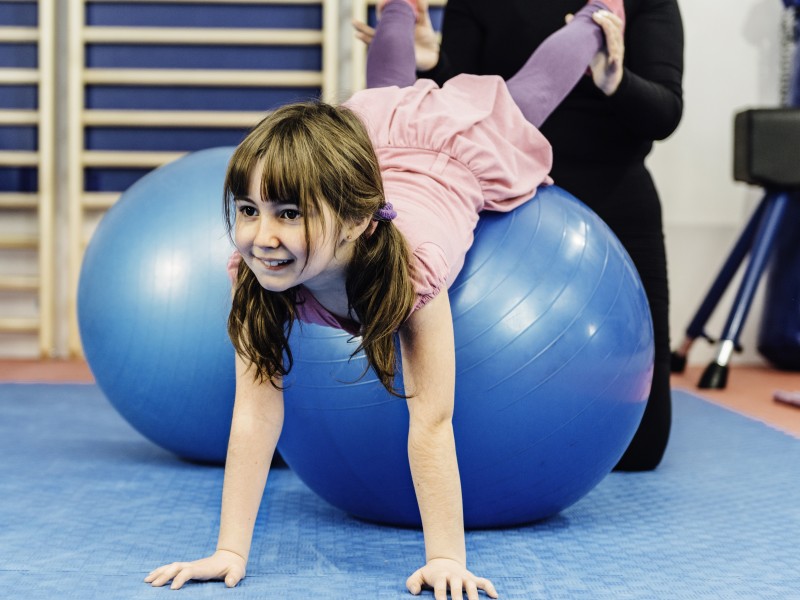The Pelvic Floor Therapy program at Phoenix Children’s is a specialty service offered at our outpatient rehab clinics. Our physical therapists are trained in treating the pelvic floor challenges unique to children. These issues – including difficulties with constipation, leakage of stool or urine, or pelvic pain – impact quality of life. They often lower a child’s self-esteem and cause stress in the household.
About Pelvic Floor Therapy
Pelvic floor physical therapy (PT) addresses underlying problems with a child’s ability to control their pelvic floor muscles. Our work focuses on the muscles surrounding the pelvis. Therapy sessions teach children how to properly contract and relax these muscles in a coordinated way. We use biofeedback to build your child’s awareness of how to properly use these muscles.
We also use exercise activities to:
- Build core strength
- Teach proper breathing by using the diaphragm
- Improve posture on the toilet
- Improve strength in the lower extremity
Conditions We Treat
Pelvic floor PT can help children with a variety of diagnoses, such as:
- Urinary issues
- Bedwetting (enuresis)
- Daytime accidents (urinary incontinence)
- Controlling urgency and how often they urinate
- Emptying the bladder completely
- Bowel issues
- Pain in the pelvis or abdomen
What to Expect at the First Visit
A pelvic floor therapist will ask a lot of questions about your child so we can fully understand their needs. We’ll gather details specific to these topics:
- Current symptoms
- Daily routines and schedule
- Diet
- Medical history
- Medicines and other treatments you have already tried
- Toileting habits
Also during this first session, the therapist will assess your child’s strength, flexibility, balance, breathing and toilet posture. If you and your child agree to it, the therapist may look at your child’s pelvic floor muscles to see how well they can tighten and relax these muscles.
The therapist will provide a care plan for treatment after the first appointment. The care plan may include home exercises to improve your child’s strength, flexibility, stability and posture. In addition, the therapist may recommend using biofeedback during future visits.
Frequently Asked Questions
Your child may benefit from a pelvic floor physical therapy program if they show these signs:
- Feeling pelvic pain
- Having frequent bladder infections or urinary tract infections (UTIs)
- Leaking stool or urine after potty training
- Night wetting after the age of 8 years old
- Straining with bowel movements or constipation
- Other toileting issues that impact their quality of life
Here are a few tips to help your child build a normal and independent toileting routine:
- Use a Squatty Potty – Your child’s pelvic floor is in the ideal position when their knees are above their hips. This position greatly helps with bowel movements for people of all ages.
- Drink more water – Drinking about 70-75% of your child’s body weight is recommended in ounces each day (for example, 40 pounds of body weight = about 30 ounces of water needed daily).
- Build a routine – Following a schedule that works for your child and family will help them find success.
As the caregiver, you’ll be present during your child’s treatments. You’ll learn other tips and behaviors to carry over at home that will help your child get the best results from therapy.
Pelvic floor therapy sessions last about an hour. Effective pelvic floor PT can take anywhere from one session to 12 depending on the child, the extent of their challenges, their willingness to do home exercises, and their interest in learning and adjusting their behaviors.
After the first session, our care team will develop a treatment plan of care unique to your child’s needs. Throughout therapy, your child’s physical therapist will evaluate their progress and discuss with you any adjustments needed to the care plan.
No, biofeedback does not hurt. Biofeedback is a tool that uses small stickers (electrodes) placed on the skin near the pelvic and glute muscles. This provides a visual display that helps children learn how to correctly relax or activate their pelvic floor muscles.
Applying and removing the stickers doesn’t hurt. When talking with your child about it, the therapist may pretend they are controllers for a video game that can be played to help train their pelvic floor muscles to relax and tighten as needed. Biofeedback lets your child see in real time how they are using those muscles.
No, we don’t perform any internal assessment or internal treatment in children. Our evaluation may include a visual exam of the perineum (the area of skin and muscle between the anus and external genitalia).
If you have an older child who may benefit from internal work, we will refer them to a specialist outside of Phoenix Children’s.
Ask your child’s gastroenterologist, urologist or pediatrician for a referral. Or you may call our rehab scheduling department at 602-933-0980.

Does my child need pelvic floor physical therapy?
Irregular toileting habits can greatly impact a child’s quality of life. Finding a pediatric pelvic floor program is key to your child’s success.
Locations


Phoenix Children's Rehabilitation Services - East Valley
3420 S. Mercy Rd.
Suite 121
Gilbert, AZ 85297
